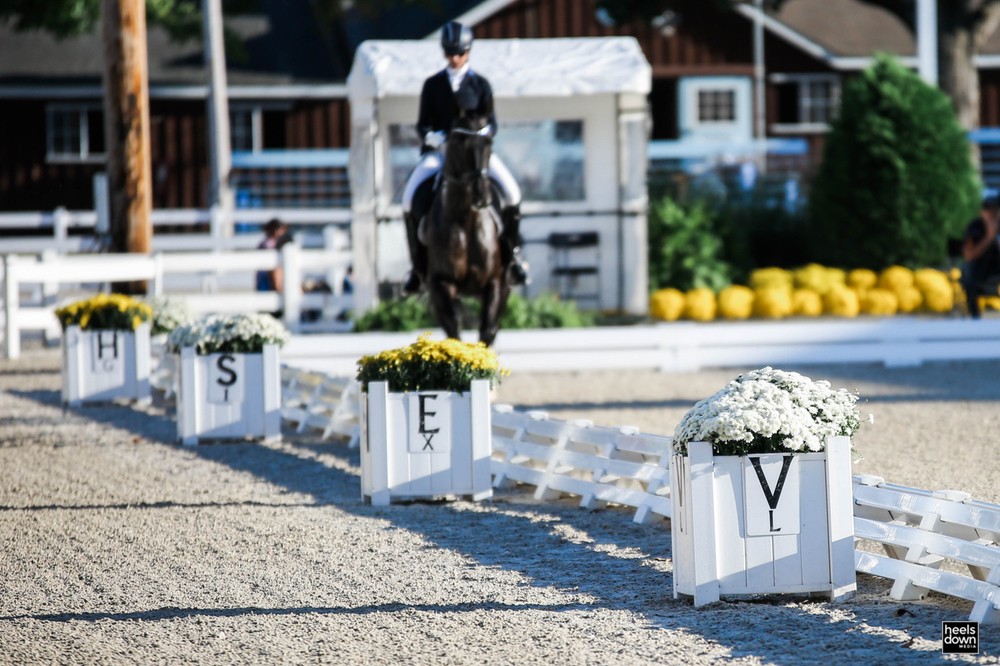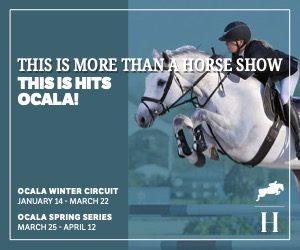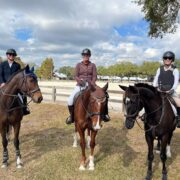Am I Over-Horsed? Or Am I Still Learning?

By Julie Steeper
I own a horse that, by most accounts, I have no business owning. He’s too talented, too athletic, too unpredictable and too high maintenance for me. But from a number of equally spectacular and overqualified options, I chose him.
The two of us find ourselves going through life as partners. The obstacles we have encountered are too many to count and I don’t know if it’s because I am stubborn or foolish, but I am determined to make this partnership work. And from my gorgeous dark bay Westphalian gelding, I have learned lessons that extend far beyond the saddle. It no longer surprises me when a riding problem teaches me a lesson that prepares me for a challenge that I soon greet in my ‘out of the saddle’ life. Sometimes it feels like coincidence and other times more like divine intervention.
Most recently, my horse won’t go forward. I don’t mean that he ignores my aids as we are moving along or that he is too casual in his movement. I mean he literally plants his feet and won’t move forward, like a stubborn school pony. This is a horse who has successfully competed at the top levels of dressage – he’s fluid, supple and dexterous. An exceptionally graceful creature to ride and to watch. He ‘should’ know better. But for me he has unfailingly and predictably perfected the halt which he pulls out at the most inopportune moments.
“The most plausible explanation is that he just doesn’t understand me. I confuse him.”
Is he trying to exert his dominance? Is this his latest way to evade work? Is he merely testing my patience? All of these explanations seem possible, but the most plausible explanation is that he just doesn’t understand me. I confuse him. I ask for two paradoxical things at the same time; two things that are incompatible. Go and whoa.
More than any other equestrian discipline, dressage demands nuanced communication between horse and rider. A dressage horse has “buttons” that other horses simply do not have. When I want my horse to move forward, I ask with the slightest leg aid which should be followed by an allowing hand. But I am terrified that forward movement could leave me out of control atop this large, powerful and agile animal, so my hands instinctively (and incorrectly) pull back. I say ‘go’ with my legs and ‘please don’t go’ with my hands. He has no idea what I want from him and so the gift he gives me is stoic stillness.
Movement is an intrinsic part of who a horse is. They are grazing animals who are constantly moving. But as riders, we can get in the way by blocking the horse from accessing the ‘wild’ part of himself which needs to be activated. I want to control my horse and I want to control the process, but there is no movement forward when we come from a place of control. Riders have to brace the uncertainty of an unpredictable partner and when you ask a horse to move forward, you cannot instantly say “well maybe not”. Just as in life, you’re either all in or you’re stuck. And once momentum carries you forward, you have to abdicate your desire for control. I will never forget the time that I heard a highly respected coach telling one of his students that she needed to dangle her reins. Sometimes we have to let go in order to move on.
The joy of riding can only be experienced when it is lightly managed rather than heavily controlled. Riding is a never ending process of checking in with your horse and then getting out of their way. It’s so easy for mistakes to be made. And even with the delivery of precise aids by the most talented riders, things can and do go wrong. After all you are riding a living, breathing creature who has a will of his own. You can’t control a 1500-pound animal, but when you partner with him the result is a beautiful, harmonious dance.
You also can’t control your life – neither the pace nor the content nor the rhythm nor the tempo of it. Control of the horse and of life is ultimately an illusion. One that we cling desperately to (especially when things go wrong) but nevertheless it is always an illusion. But we can show up willingly and with an open heart, always prepared to learn and to grow from our mistakes. Only when we learn to get out of our own way, do we get to access magic both in and out of the saddle. And we have to remember that sometimes we end up with the horse that we actually need, not the horse that we think we need.


